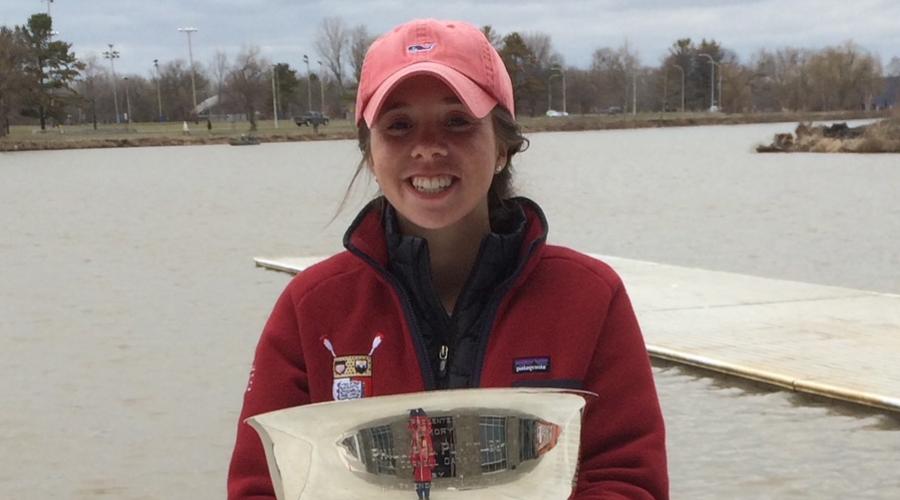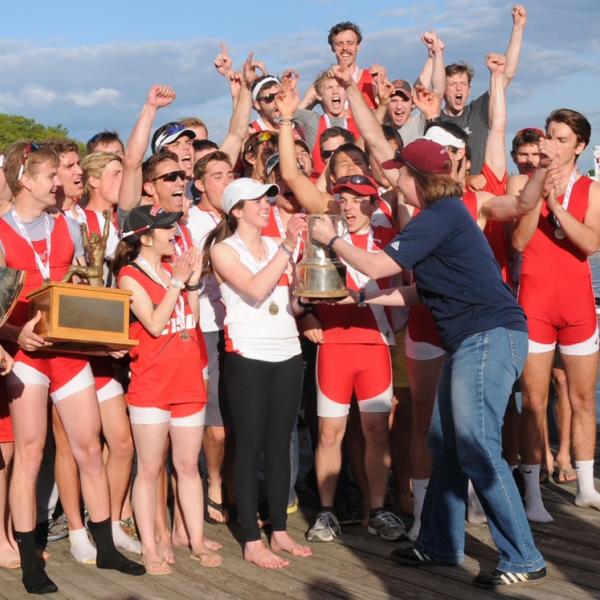
Katie Falb DeNitto ’15
During her time at Cornell, Katie Falb DeNitto ’15 was a coxswain for the Big Red’s men’s lightweight rowing team. She lead the varsity eight crew to undefeated 2014 and 2015 regular seasons, before helping the team earn back-to-back Ivy Championships and consecutive Intercollegiate Rowing Association National Championships. She then traveled with the team to England to compete in the 2014 and 2015 Henley Royal Regattas.
DeNitto, who spent most of her high school rowing career as a coxswain on a youth men's team, knew she wanted to attend a school with good academics and a rowing program that cared about the coxswain position.
She found both at Cornell.
"I could tell that the coaches cared about the coxswains and their development," DeNitto said. "At Cornell, there was much more of an emphasis on training the coxswains and integrating them within the team, which was important to me when I was looking at programs."

DeNitto's years of coxswain experience made her a valuable asset to the program. And after she took a class revolving around training sessions for new employees at the ILR School, DeNitto was approached by Chris Kerber, the Henry E. Bartels ’48 Head Coach of Men’s Lightweight Rowing, to create a training guide for the program's future coxswains.
Her coxswain training guide, which includes maps of the courses, drawings of the most efficient race routes, landmarks to look for, and audio recordings, is one of her lasting legacies within the program.
"The year after I graduated, one of the rowers reached out and thanked me for pulling together all of the materials since it was helpful to the new coxswains," DeNitto said. "It's a cool legacy to be a part of."
DeNitto is currently a vice president at an investment firm in Boston. Her primary responsibilities are in both the investor relations and operations departments.
She responded to questions below about her ILR experiences and her hopes for the school’s future.
How did ILR change you?
ILR exposed me to a wide variety of content that I believe is directly applicable to pursuing a career in the 21st century. The ILR curriculum set me up to succeed in my post-graduate endeavors by preparing me for involvement across a variety of business verticals. Through courses such as “Organizational Behavior,” “Gendered Workplace” and “Work Groups and Teams,” ILR helped me understand what makes teams and organizations function at a high level, which is an important, yet often ignored, skill to have in any workforce. I have also found the content from “Managing Compensation” and “Employee Training & Development” to be particularly interesting and applicable.
In fact, I was able to put much of my ILR coursework to use during my time at Cornell. As a coxswain on the varsity men’s lightweight rowing team, I designed a training manual to provide instruction for future coxswains. This manual included directions for how to efficiently manage a boat on a day-to-day basis, as well as things like course maps of the different racecourses that the team competes on each season.
Because every race course is different, it is helpful to understand the nuances of each. Races in the spring season tend to be on 2000-meters straight courses with buoyed lane dividers – on these types of courses, it is helpful to know which lanes experience more wind resistance, which have strongest underwater currents, etc. On the other hand, the racecourses in the fall season tend to be longer and on windy rivers. On these types of courses, it is imperative to know what the fastest line from start to finish is. For example, The Head of the Charles Regatta in Boston has multiple hairpin turns in it – the instruction of an experienced coxswain or coach explicitly directing a novice how to steer the course can be a significant factor in the outcome of the race.
How are you making an impact through your experiences at ILR?
When I was taking my coursework at ILR, I knew that the classes were unique when compared with any other undergraduate program I knew of. The “hands on” approach to learning the insides of how businesses really function, beyond other programs’ standard “Intro to Marketing” or “Business 101” courses provided me with crucial insights as to what drives success in the workforce – both for employees and employers.
Since graduating from ILR, I believe I have made an impact within the different teams I have been involved with across the firms I have worked for. Having a good understanding of how to organize and motivate a well-functioning group has proved to be a very useful skill that is highly valued by management.
Likewise, over the past two years, I have been involved with Big Brothers Big Sisters of Mass Bay, working in their Mentor 2.0 program.
I have found this to be a really powerful opportunity to take some of the training skills that I learned from ILR to apply them toward mentoring a young person through their high school years. I believe that ILR’s curriculum, which exposed me to a wide variety of industries and job verticals, has helped equip me to provide advice to high schoolers in Boston about what opportunities are available for them in the workforce.
How might the mission of ILR help shape the next 75 years of work, labor and employment?
As we begin to think about what the “new normal” post-COVID-19 looks like, firms are going to need to take a hard look at how 15-plus months of work from home for many employees will impact businesses across all industries. I believe that graduates of the ILR School would be well equipped to help these firms consider how to handle what the “new normal” for each unique business is going to work. For some, reverting to the pre-COVID model might make the most sense. However, from my human resources and classes at ILR, I know that there is a large contingent of workers, especially millennials, who value certain benefits above pay. Having the flexibility to work from home full- or part-time in the future is likely a benefit that will be desirable, and firms will need to adapt in order to attract and retain talent.
